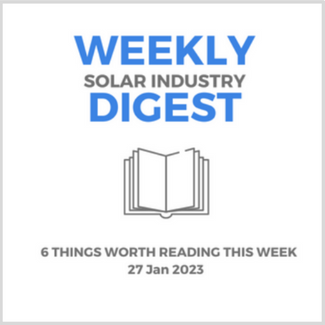This Soligent Beyond Emissions podcast episode features two guest speakers: a sales lead for Soligent and a Product Trainer at Enphase (an installer of Gov Jerry Brown’s solar system). The speakers discuss the Soligent “people first” culture, why no one should procrastinate in the face of NEM 3.0, and all things solar + storage stock.
To try to “confront China” and stymie any efforts from Chinese manufacturers to skirt trade rules, Republicans in the House are looking to roll back Biden’s 2 year stay on solar tariffs. The debate does not fall neatly along party lines, thought SEIA and other solar advocates are against reversing the stay.
SPW discusses the proliferation of floating solar in the US. They dig into companies pursuing it and particularly look at the floats, mooring and anchors of the model. The article talks about strategies around assembly and addresses the difficulties involved. One manufacturer says that while it is still pricer than ground-mount, it is a viable alternative when ground-mount isn’t an option.
There are a number of important developments on the horizon for renewable energy proliferation in America: 1) growth across all DER and technology sectors partially due to favorable policies, 2) ongoing regulatory improvements that support market development, 3) advancement in the wholesale market and distribution system, and 4) greater engagement by local leaders in regularity and legislative decisions.
Climate insurance provider kWh Analytics has partnered with Aspen Insurance to launch property insurance coverage for renewable energy assets. They are also encouraging resilient design practices based on their historical operating data which allows them to ID common failure modes among existing solar PV projects and incorporate them into the Property Insurance underwriting.
The CEO of ALICE Technologies digs into how to minimize solar project delays and cut costs using principles behind their tech. He talks about assessing obstacles on the horizon, prioritizing and categorizing them to handle them most effectively when looking at where your business should focus its efforts, tapping a tech they’ve created called dynamic generative scheduling, and being attentive to your business timeline.

